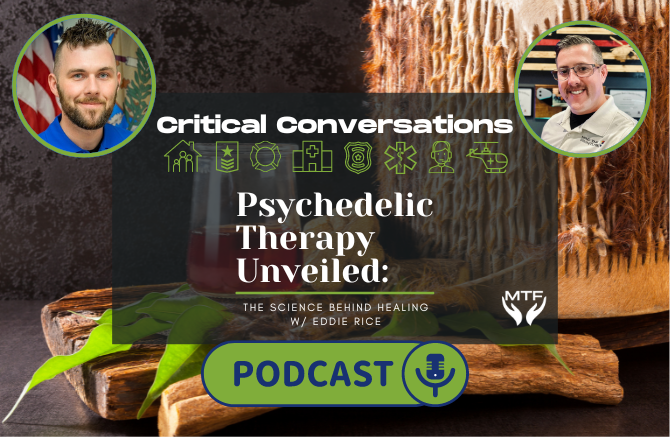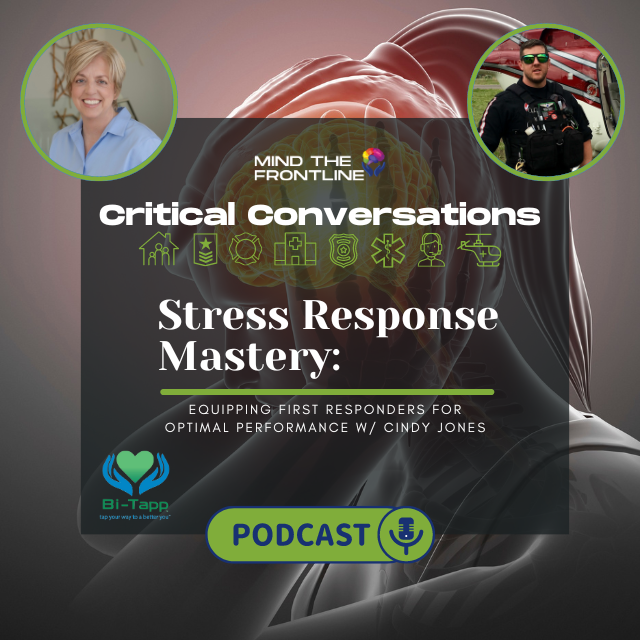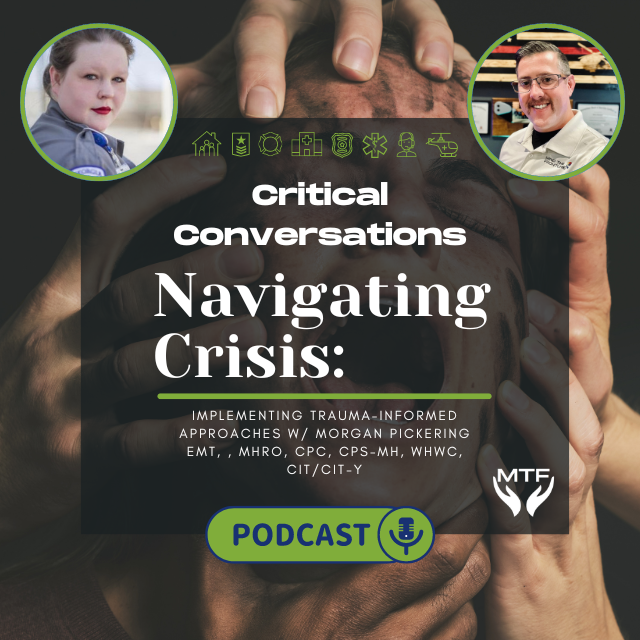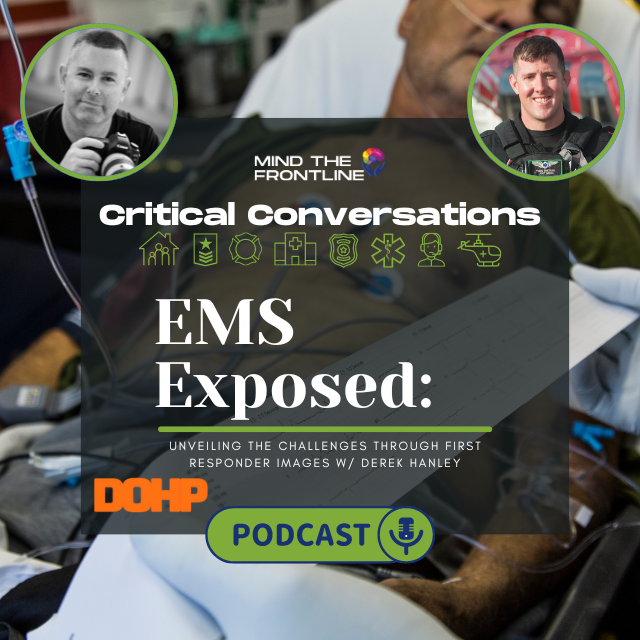Stress Response Mastery: Equipping First Responders for Optimal Performance
Mastering Stress Responses: Empowering First Responders for Peak Performance
5 min read
 Chris Smetana, AS, FP-C, CCP-C, NRP | Founder/President
:
Apr 30, 2024
Chris Smetana, AS, FP-C, CCP-C, NRP | Founder/President
:
Apr 30, 2024

Explore the world of Psychedelic Assisted Therapy for first responders and debunk common misconceptions surrounding this innovative approach to mental health treatment.
Psychedelic-assisted therapy, a groundbreaking approach to mental health treatment, harnesses the transformative power of substances like psilocybin or MDMA in a controlled therapeutic setting. These substances, known for their profound effects on brain function, have been shown to induce shifts in perception, mood, and cognition, opening the door to deep introspection and healing. Through advanced neuroimaging techniques like fMRI, researchers have observed changes in brain activity patterns that highlight increased connectivity between key regions responsible for emotional processing and self-awareness.
Furthermore, the emerging field of psychedelic therapy suggests that these substances may promote neuroplasticity, the brain's remarkable ability to rewire and form new connections. This neurobiological mechanism could be the key to unlocking the therapeutic potential of psychedelics in supporting first responders' mental health. By understanding the intricate ways in which these substances interact with the brain, therapists can tailor treatment protocols to maximize healing and personal growth for those on the frontlines of crisis response.

Psychedelic Assisted Therapy for first responders is often surrounded by misconceptions and myths that contribute to the stigma around this treatment approach. By addressing these misconceptions head-on, we can help to break the stigma and promote a better understanding of the potential benefits of Psychedelic Assisted Therapy for first responders.
One common misconception is that Psychedelic Assisted Therapy is simply about getting high or experiencing a recreational drug trip. In reality, this therapy is conducted in a controlled and supportive environment, with the use of carefully selected psychedelic substances under the guidance of trained professionals. It is not about seeking a recreational high, but rather about using these substances as tools to facilitate a deeper exploration of the self and the healing process.
Another myth is that Psychedelic Assisted Therapy is dangerous and can lead to negative outcomes. While there are risks associated with any form of therapy, when conducted in a safe and supervised manner, Psychedelic Assisted Therapy has shown promising results in helping first responders heal from PTSD and other mental health conditions. Research studies have demonstrated the potential for long-lasting positive effects, including reduced symptoms of PTSD, increased emotional well-being, and improved overall quality of life.
Addressing these misconceptions and myths is crucial in order to provide accurate information and promote an open dialogue about the potential benefits and risks of Psychedelic Assisted Therapy for first responders. By dispelling these myths, we can create a more supportive and informed environment for those seeking this innovative approach to mental health treatment.
-Apr-30-2024-03-56-35-8596-PM.png?width=307&height=200&name=Blog%20Pictures%20(1)-Apr-30-2024-03-56-35-8596-PM.png)
Real-life success stories and case studies provide valuable insights into the potential of Psychedelic Assisted Therapy in mental health treatment for first responders. These stories highlight the transformative experiences and positive outcomes that can be achieved through this innovative approach.
For example, there have been cases where first responders who have struggled with PTSD for years have experienced significant relief and improvement in their symptoms after undergoing Psychedelic Assisted Therapy. These individuals have reported a reduction in intrusive thoughts, nightmares, and anxiety, as well as an increased sense of inner peace and emotional well-being.
Case studies also demonstrate the importance of proper preparation and integration in maximizing the benefits of Psychedelic Assisted Therapy. Preparing individuals for the experience, setting intentions, and providing ongoing support and integration afterward are crucial elements in ensuring positive outcomes.
By sharing these real-life success stories and case studies, we can inspire hope and encourage further research and exploration of Psychedelic Assisted Therapy as a viable option for first responders struggling with mental health conditions.
-Apr-30-2024-03-56-35-5259-PM.png?width=307&height=200&name=Blog%20Pictures%20(2)-Apr-30-2024-03-56-35-5259-PM.png)
Safety and regulation are important considerations when it comes to Psychedelic Assisted Therapy for first responders. As this treatment approach involves the use of controlled substances, it is essential to navigate the legal and ethical landscape to ensure the well-being of both the participants and the professionals involved.
Currently, the use of psychedelics in therapy is regulated and restricted in many countries. However, there is a growing body of research that supports the therapeutic potential of these substances, which has led to increased interest in revisiting legal and regulatory frameworks. Some jurisdictions have already taken steps to decriminalize or legalize certain psychedelics for medical or therapeutic use.
Ethical considerations in Psychedelic Assisted Therapy include obtaining informed consent, ensuring participant safety during the therapy sessions, and maintaining confidentiality and privacy. Additionally, professionals providing this therapy must have appropriate training and qualifications to ensure the highest standard of care.
Navigating the legal and ethical landscape of Psychedelic Assisted Therapy requires ongoing dialogue, research, and collaboration between policymakers, healthcare professionals, and regulatory bodies. By addressing these considerations, we can create a safe and supportive framework for the responsible use of psychedelics in mental health treatment.
-Apr-30-2024-03-56-35-4028-PM.png?width=307&height=200&name=Blog%20Pictures%20(3)-Apr-30-2024-03-56-35-4028-PM.png)
Integrating Psychedelic Assisted Therapy into comprehensive mental health treatment plans can provide a holistic approach to healing for first responders. By combining this innovative therapy with other evidence-based treatments, we can enhance the effectiveness and sustainability of mental health interventions.
Psychedelic Assisted Therapy can be integrated into existing treatment modalities, such as cognitive-behavioral therapy (CBT) or eye movement desensitization and reprocessing (EMDR), to address specific symptoms and trauma-related issues. The unique properties of psychedelics, such as their ability to promote introspection and enhance emotional processing, can complement and enhance the therapeutic process.
Furthermore, the integration of Psychedelic Assisted Therapy can extend beyond individual sessions to include ongoing support and integration practices. This may involve group therapy, mindfulness practices, and lifestyle changes that support long-term healing and well-being.
By exploring the role of Psychedelic Assisted Therapy in comprehensive mental health treatment plans, we can optimize the benefits and outcomes for first responders seeking holistic and transformative healing.
-Apr-30-2024-03-56-35-6483-PM.png?width=307&height=200&name=Blog%20Pictures%20(4)-Apr-30-2024-03-56-35-6483-PM.png)
The future of Psychedelic Assisted Therapy holds great promise for first responders and their mental health. Ongoing research and innovation in this field continue to shed light on the potential impact of this therapy and open new avenues for treatment and support.
Research studies are investigating the mechanisms of action of psychedelics on the brain and how they can be harnessed to facilitate healing and transformation. Innovative approaches, such as combining psychedelics with virtual reality or neurofeedback, are being explored to enhance the therapeutic experience.
Moreover, the potential impact of Psychedelic Assisted Therapy extends beyond individual healing. By addressing the mental health challenges faced by first responders, this therapy has the potential to improve overall well-being, reduce healthcare costs, and enhance the resilience and effectiveness of these vital individuals in their roles.
As research and innovation progress, it is important to ensure responsible use, ongoing evaluation of outcomes, and the development of evidence-based protocols and guidelines. Collaboration between researchers, clinicians, policymakers, and first responder communities is crucial in shaping the future of Psychedelic Assisted Therapy and maximizing its potential benefits.
-2.png?width=307&height=200&name=Blog%20Pictures%20(5)-2.png)

In El Reno, Oklahoma, I faced adversity with resilience and sought self-discovery and redemption. From a challenging upbringing, I found purpose in a career in EMS & Law Enforcement. Despite trauma and struggles with addiction, spirituality and support led me to profound healing and renewal. This journey showcases hope, resilience, and the transformative power of facing challenges head-on.
Explore many valuable First Responder Mental Health and Wellness resources on Mind the Frontline's online platform. Discover the link below to access a wide range of support and information tailored specifically for first responders.
Additional Mind the Frontline Resource's
Stay connected with Mind the Frontline on Facebook & LinkedIn.
$50 off code:frontline40
Invest in your mental health with the Mind Shield Health and Wellness Membership—a transformative resource tailored for first responders. For less than $4 per month, this 100% tax-deductible membership offers a suite of exclusive benefits designed to enhance your overall well-being.
Membership Highlights:
The Largest Online First Responder Mental Health and Wellness Resource Directory: Immediate access to a comprehensive database catering to the unique needs of first responders.
State-by-State Mental Health, Wellness, and Recovery Resources: Navigate a localized guide for personalized support.
MindShield 24/7 Debrief Hotline: Confidential and secure debriefing space, available whenever you need it.
Virtual 1-1 Peer Support: Connect with a supportive network of peers through our virtual platform.
Mind the Frontline's Preferred Mental Health Providers List: Access trusted mental health professionals aligned with our mission.
Discounts to Mental Health Apps: Exclusive discounts on leading mental health apps like Headspace and more.
Recommended Books, Podcasts, and Resources: Curated selection to enhance your mental health journey.
Weekly Blog Articles/Podcasts: Stay informed and inspired with regular content delving into crucial insights and topics.
Interactive Workshops and Webinars: Engage in dynamic sessions promoting mental health, career development, and overall well-being.
Mindfulness and Meditation Resources: Tools for incorporating mindfulness into your daily routine.

Mastering Stress Responses: Empowering First Responders for Peak Performance

Explore the importance of trauma-informed approaches in crisis management for veterans and first responders.

Welcome to Mind the Frontline's latest exploration into first responder mental health and wellness. In this blog, we delve into the captivating realm...